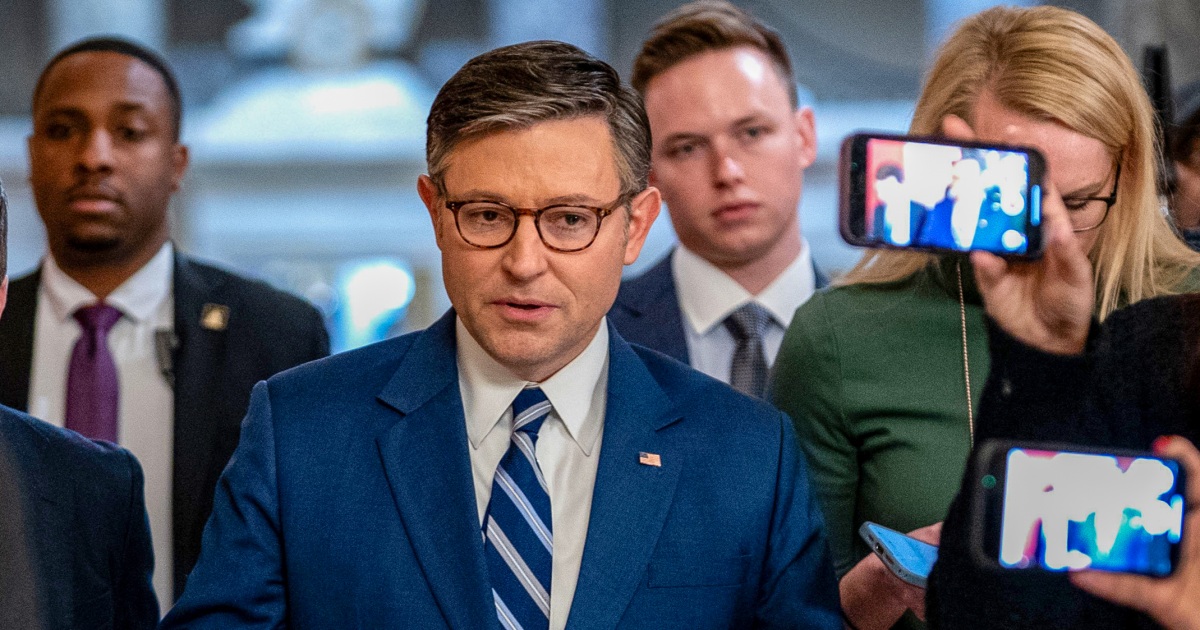WASHINGTON — Speaker Mike Johnson on Tuesday muscled a multitrillion-dollar budget blueprint through the House by the narrowest of margins — a crucial step for Republicans as they embark on advancing President Donald Trump’s legislative agenda.
The vote was 217-215, with Republicans casting all of the votes in favor of the budget resolution. Just one Republican, Rep. Thomas Massie, R-Ky., joined all Democrats in voting against it.
The vote came after a dramatic day of arm-twisting in the House, with Johnson hosting multiple meetings in his office to win over GOP holdouts and Trump personally calling many of those same individuals.
“We got it done,” Johnson said after the vote. “This is the first important step in opening up the reconciliation process. We have a lot of hard work ahead of us. We are going to deliver the America First agenda.”
Three conservative members who had been publicly opposed to the budget plan— Reps. Tim Burchett of Tennessee, Victoria Spartz of Indiana, and Warren Davidson of Ohio — ultimately flipped and voted in favor of it.
“There’s no quid pro quo but the president assured me that he would work toward cuts and he’s never lied to me,” Burchett, who had expressed concern over the level of spending cuts the resolution would allow for, said after the vote. “He’s always been honest about it.”
Earlier Tuesday evening, in a chaotic moment, House Republican leaders appeared to briefly cancel the budget vote and send members home for the night, only to abruptly call up the vote and bring lawmakers back to the floor minutes later.
The successful vote puts the ball back in the Senate’s court. Because Trump has endorsed the House budget plan, the Senate will be under pressure to take up and pass that blueprint, even though the upper chamber adopted its own version earlier this month.
Under reconciliation, the process Republicans are using to attempt to enact Trump’s policy priorities on a party-line basis, both chambers need to pass the same budget resolution before committees can officially draft the legislative package.
The fate of the House’s resolution was uncertain for much of the day. In addition to the small band of conservatives who cited concerns over spending levels, more moderate Republicans expressed worry over potential cuts to Medicaid. But after a full day of meetings with Johnson and after Trump himself began calling holdouts, some of them began to soften their opposition.
“He was a big help, as always,” a smiling Johnson said of Trump as he left the House floor.
The budget measure calls for $4.5 trillion in tax cuts and a goal of $2 trillion in spending cuts. It includes more than $100 billion in new spending on immigration enforcement and the military. It also requires the House Energy and Commerce Committee to find $880 billion in cuts to federal programs, and Republicans say some of that will come from reducing spending on Medicaid.
Democrats unified in opposition to the GOP budget plan, slamming it as a tax cut for the wealthy that will hurt working-class families by cutting Medicaid. They have coalesced around that political message intended to drive a wedge between Trump and swing voters, as well as his own voters who rely on federal benefits.
Early Tuesday afternoon, the House advanced the budget resolution on a procedural vote of 217-211, which set up the final vote Tuesday evening. Four Democrats and one Republican did not vote, giving Johnson some extra breathing room.
But three of the Democrats who had missed that vote — Reps. Frederica Wilson of Florida, Brittany Pettersen of Colorado and Kevin Mullin of California — unexpectedly showed up for the final budget vote, adding an extra wrinkle for Johnson and the Republicans.
The House’s vote Tuesday to adopt a budget blueprint is merely one step of a complicated process Republican lawmakers are undertaking to advance Trump’s agenda. Both the House and Senate must adopt the same resolution before committees can craft a massive party-line bill. The Senate voted for a different budget resolution that dealt with the border, defense and energy, while leaving taxes for a separate measure.
“It’s just a first step in the process,” House Ways & Means Committee Chair Jason Smith, R-Mo., told NBC News. “We did something that people didn’t think we could do. We passed a budget resolution.“












